Note: Today’s post is a little too long for email because it has a lot of images, so to make sure you don’t miss anything, please click through to the full text.
While visiting Montana with my children two weeks ago, I thought of Benjamin Franklin’s essay, “Remarks Concerning the Savages of North America,” because it resonates so deeply with how I feel when I come home. Franklin’s purpose in “Remarks” is to critique Europeans’ racist view of Native Americans and to call the definition of civilization into question. It’s still a good essay on its own merits, but I thought of it during my visit because Montana life is so poorly understood by many Americans.
When I tell people on the East Coast that I’m from Montana, I typically get one of the contradictory views that the Puritans brought to New England. Either Montana is "a hideous & desolate wilderness, full of wild beasts & wild men” (as William Bradford wrote of the Hudson Valley) or it is a sanctuary from corrupt society (as John Winthrop imagined a New Jerusalem). In more current parlance, Montana is either a breeding ground for domestic terrorism or The Last Best Place.
I almost titled this post “Remarks Concerning the Savages of Northwest Montana,” but I knew it would be misunderstood, and I didn’t want to troll for web traffic by intentionally inciting controversy. Perhaps you’ll agree with me that Franklin’s essay echoes present-day views not just of Montanans, but of many rural Americans.
“Savages we call them, because their manners differ from ours, which we think the Perfection of Civility; they think the same of theirs.”
Who gets to define good manners?
One of my cousins is a Marine veteran and ultra-MAGA type whom I love and who also enjoys my company. He invited me over for lunch one day, and while he was grilling deer smokies I studied the stickers plastered across his refrigerator. One of them showed Trump peeing on the word “LIBTARDS.” It reminded me of Hillary Clinton’s description of Trump supporters as a “basket of deplorables” and Barack Obama’s remark about rural voters who “cling to guns and religion.”
Then I thought about how similar this all sounded to Franklin’s opening line in “Remarks”: “Savages we call them, because their manners differ from ours, which we think the Perfection of Civility; they think the same of theirs.”
Montana makes political headlines like those you see about Iowa and Florida. The Governor, Greg Gianforte, won election despite being convicted of assault after body-slamming a reporter who asked him an annoying question. In fact, that act of violence probably helped his candidacy more than it hurt. Montana also made news this year for silencing a transgender lawmaker and for banning TikTok. There’s nothing untrue about these stories — deep veins of conservatism and libertarianism run through the state. And sometimes that turns ugly.
However, Montana is also a place where people who are political opposites can live harmoniously as neighbors. On the drive to a trailhead in the Yaak Valley, where I took my two girls camping, I passed a driveway with the sign “Camp Patriot.” It’s not the militia stronghold you might expect — I find much to admire in its mission statement.
The very next driveway had a garland of Tibetan prayer flags strung over the entrance. That’s just how it is in Montana.
Educated or good for nothing?
I can’t adequately describe the pull that northwestern Montana has on me. It grows stronger the older I get, the feeling that my spiritual home is there, the hunger to find a more permanent way back. And yet I also remember what drove me away as a young person. The timber industry was dying, a nearby ASARCO mine closed (rumored to be the second-largest silver mine in the world at the time), and every young person in my high school class was urged to seek a professional future elsewhere. So I went to college, then to graduate school, and on to an academic career that has, to this day, kept me in perpetual exile from the Mountain West.1
It’s still hard to make a living in Montana. Most people who do aren’t striking it rich. Those who manage to build a comfortable life usually have to accept a tradeoff, such as seasonal travel for work or a long commute. My cousin often spends months at a time inspecting oil sites in New Mexico, Texas, or North Dakota. And when that work runs thin, he’ll take his RV to boomtowns like Coeur d’ Alene, Kalispell, or Whitefish, where he supervises construction projects all week and drives home on the weekends.
There’s not much that my PhD is good for in Troy or Libby. I can run a chainsaw, but not efficiently enough for anyone to hire me as a logger. I could fight fires seasonally, as my father still does at age 73, or try to work my way into a permanent position with the Forest Service. I could get certified as a high school teacher and work my way into administration. Or I could get a remote job somewhere and bring that privilege with me.
But I can’t weld, I have no meaningful experience in construction or roofing or any of the industries that flourish in rural areas. This often makes me feel useless in Big Sky country, and it reminds me of another passage from Franklin’s essay.
Near the beginning of “Remarks,” Franklin recalls an invitation extended by Virginia officials to the six nations of what would later become the Haudenosaunee Confederacy after the Treaty of Lancaster in Pennsylvania in 1744.2 The Virginia bureaucrats proposed that the chiefs send six young men to Williamsburg for a college education. After waiting a day to show that they had given the invitation respectful consideration, the tribal leaders sent their reply.
The Indian messenger began by thanking the government officials for their offer, since lodging and education would be expensive. But he explained why the tribes did not consider the opportunity to be in their sons’ best interest. They’d already tried that, it turned out, and the results were less than impressive.
…[Y]ou who are wise must know, that different Nations have different Conceptions of things; and you will therefore not take it amiss, if our Ideas of this Kind of Education happen not to be the same with yours. We have had some Experience of it: Several of our Young People were formerly brought up at the Colleges of the Northern Provinces; they were instructed in all your Sciences; but when they came back to us they were bad Runners, ignorant of every means of living in the Woods, unable to bear either Cold or Hunger, knew neither how to build a Cabin, take a Deer, or kill an Enemy, spoke our Language imperfectly; were therefore neither fit for Hunters, Warriors, or Counsellors; they were totally good for nothing.
Point made, eh? But Franklin turns the satirical screw a little tighter at the end of the messenger’s reply:
We are however not the less obliged by your kind Offer, tho’ we decline accepting it; and to show our grateful Sense of it, if the Gentlemen of Virginia will send us a dozen of their Sons, we will take great Care of their Education, instruct them in all we know, and make Men of them.
In a time when many young people, and young men in particular, are rejecting college in favor of learning a trade, one might reasonably say that Montana offers a superior education in self-sufficiency. Rise through the ranks in construction while learning how to hunt elk and cure your own sausage. What better place to be an Internet entrepreneur than my birthplace, Lincoln County, which has thousands of acres of public land? You can pick a year’s worth of morel mushrooms and huckleberries on the weekends, pack your freezer full of venison, trout, and sturgeon, and barter for other necessities, as my parents do.
Montana is a place where nostalgia holds up. Whatever stories I’ve told my kids about previous visits match the reality, as you can see from the gallery below. My eldest daughter was terrified of my rock jumping at a swimming hole during our last visit three years ago, and this year she tried it herself. 20 jumps later, we finally dragged her away. I love it when I can share something from my youth that becomes woven into my children's own sense memories. The taste of huckleberries straight from the bush. The self-respect earned after a long hike. The jolt of a trout on your line. The color scheme of rock against a thick blanket of fir and spruce. After this last trip, I know that each of my three children came away with a piece of Montana lodged deep within them.
But there is also a danger in romanticizing Montana too much. It leads to an equally harmful lie about the place, which recasts Montanans as something akin to Noble Savages.
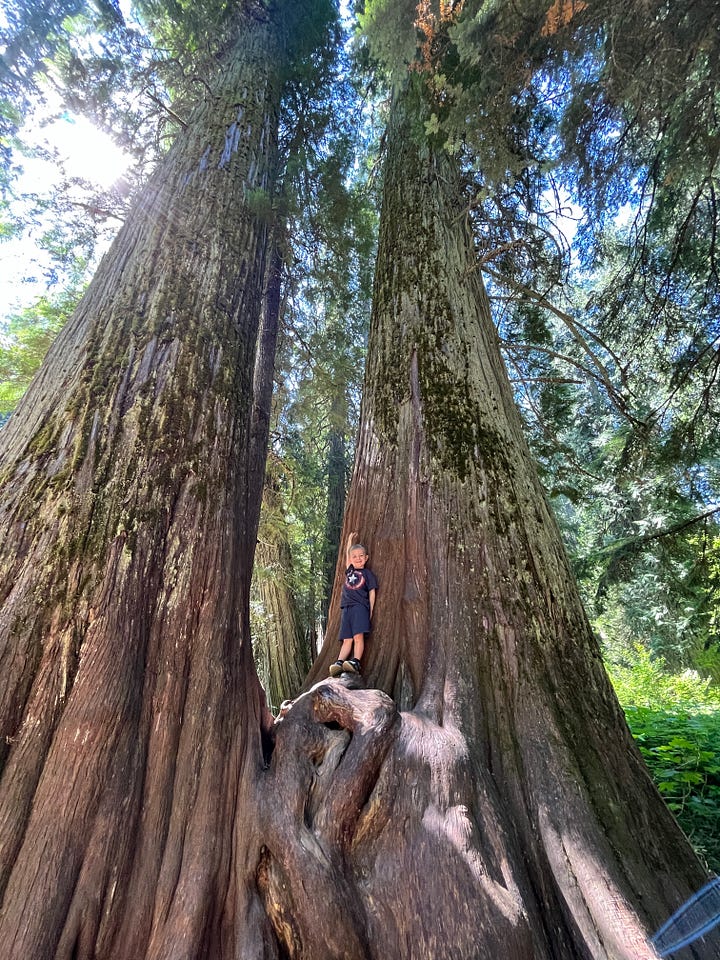
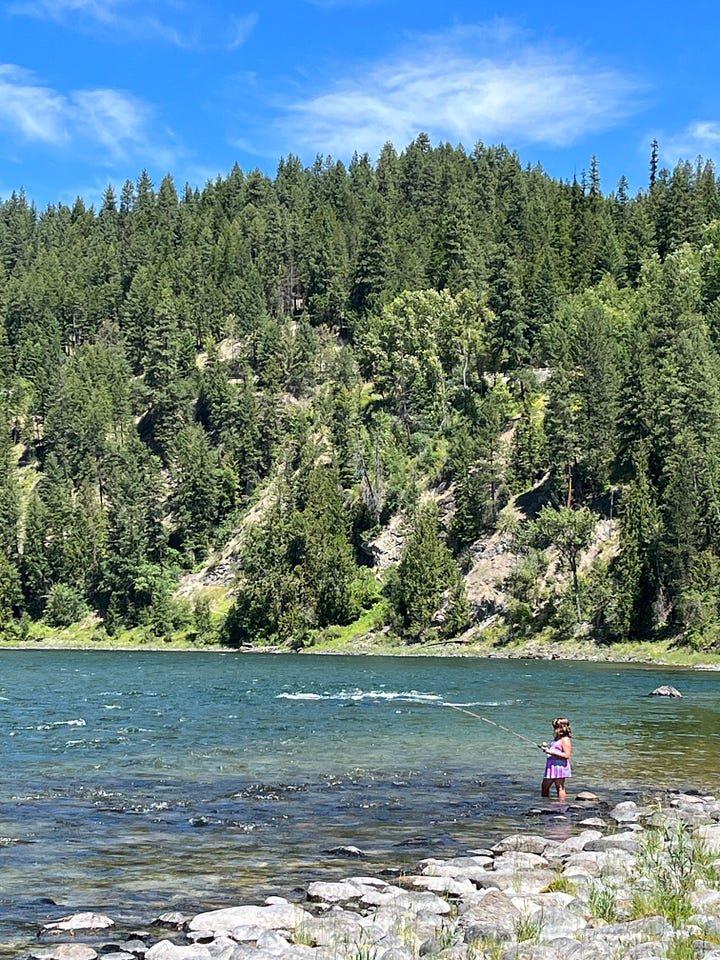
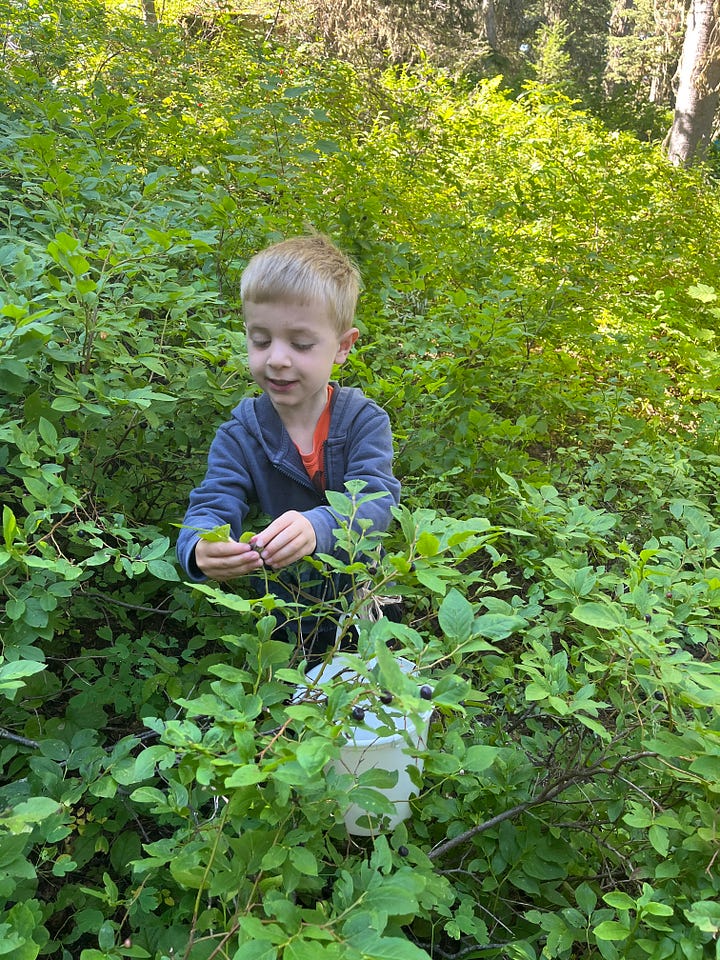
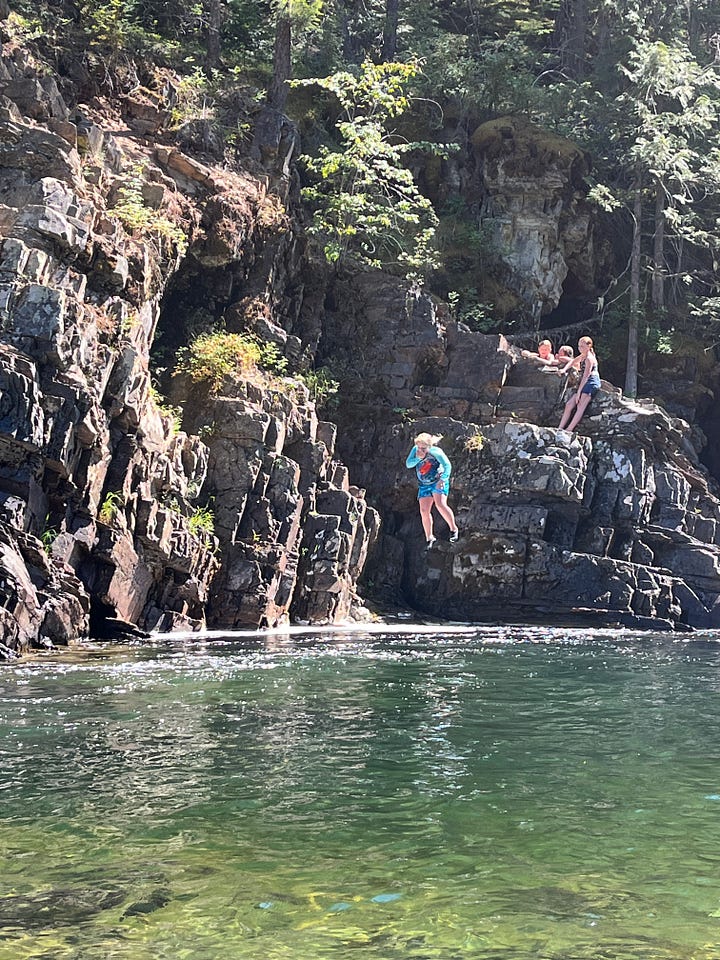
Montana is not Paradise
Many homes in Troy and Libby have a magnet on the fridge that says, “Montana: 9 months winter, 3 months relatives.” It’s easy to dip into a beautiful summer and then leave. But people who live there year-round experience things differently.
One of my uncles still runs a tree removal business there even though he has reached retirement age. During my recent visit, we met by accident at a park where he and my aunt were taking a lunch break in the shade after working all morning in 90-degree heat. It was good to see him, and we swapped many colorful stories.
My uncle is a happy man, a consummate craftsman, and an excellent writer. He has even invented many labor-saving devices, which he shares for free on his YouTube channel. Check out his “Schertel Saw” at the link below.
His furniture is another one of those things that makes me feel like I went to college and came home totally good for nothing.

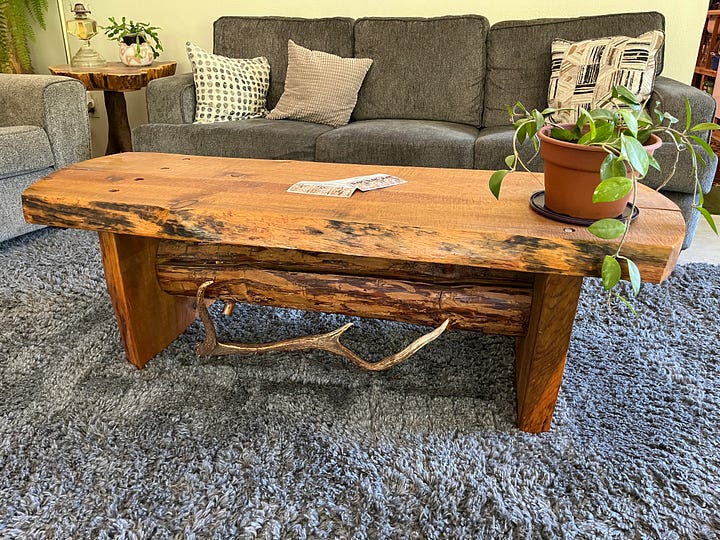
My uncle wouldn’t want your pity, but he wouldn’t want to be held up as a noble yeoman, either. He’d be the first to admit that staying put in the place where he most wants to live, weathering the economic ups and downs of rural Montana while steadily growing older, has cost him something, even if he’d do it all over again.
My uncle reminds me of the parable of the businessman and the fisherman, which is popular on LinkedIn. Billy Oppenheimer shared a version of it recently that is incoherent enough to warrant scrutiny.
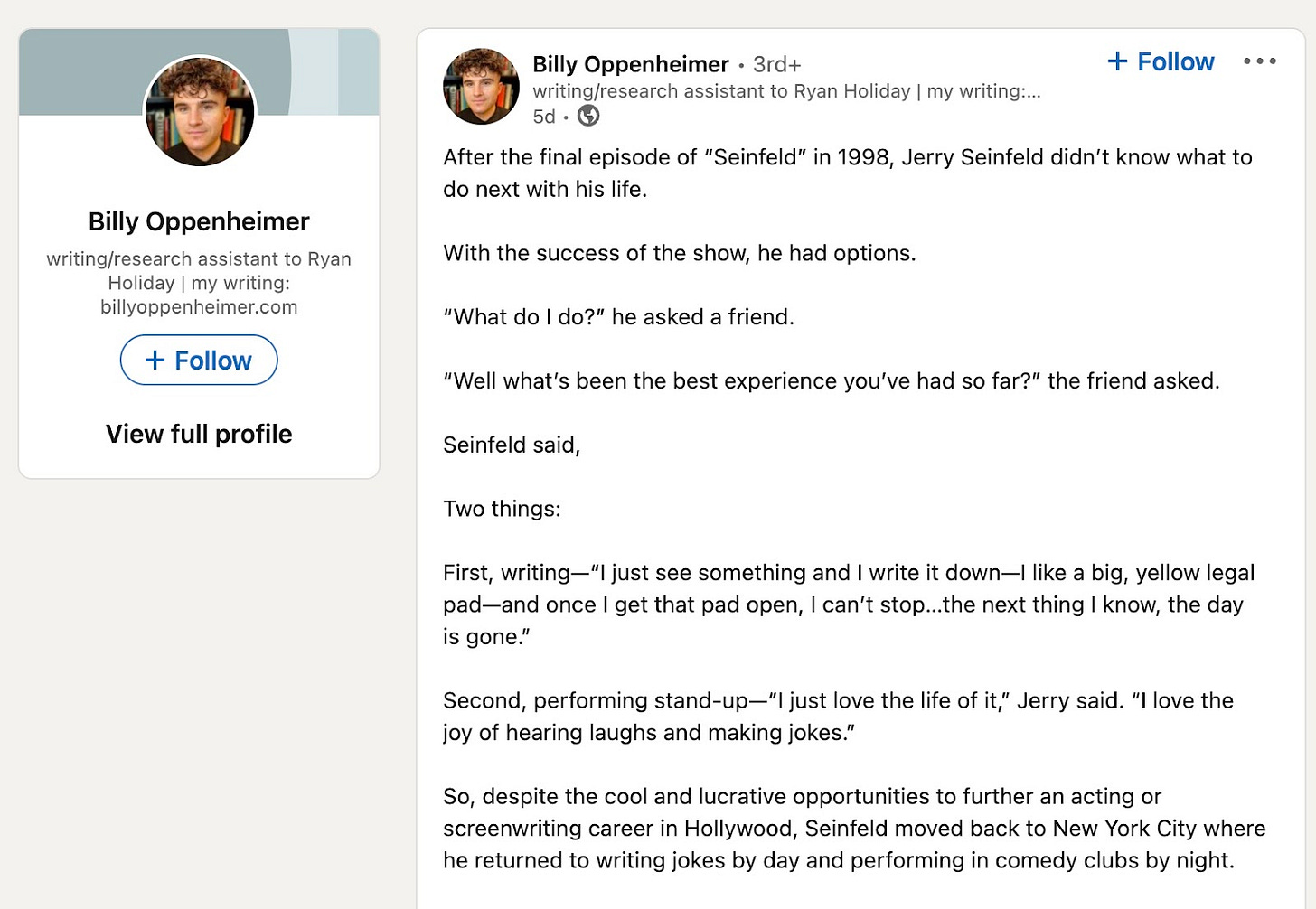
The gist is this. Jerry Seinfeld did not leverage the outrageous success from his eponymous show for more lucrative acting opportunities. He returned to his roots as a stand-up comedian, filling a big legal pad with ideas every day and sometimes walking out onto the stage. Billy concludes, “The ability to do what you want for as long as you want is priceless and, often, inexpensive.” And to illustrate the point, he cites the parable of the businessman and the fisherman.
The post resembles lies about Montana that airbrush human pain with scenery. Billy sees Seinfeld pointing us away from the rat race, so we don’t end up turning into some less powerful version of the Roy family in Succession. But how hard is it, really, to cache your millions in the bank, buy a few designer hoodies, and go perform stand-up for the fun of it? If Seinfeld started out as a poor fisherman, made it big, and then went back to fishing for the fun of it, there is no moral principle to extract at all — it’s simply a story about leveraging privilege to spend your time how you wish.
The same is pretty much true of me every time I return to Montana for a fun-packed week. I’m skimming the cream without absorbing any of the scarcity.
I think Billy is trying to say something similar to what filmmaker and mountain climber Jimmy Chin shared on Instagram recently: “there is a leisure class at both ends of the economic spectrum.”
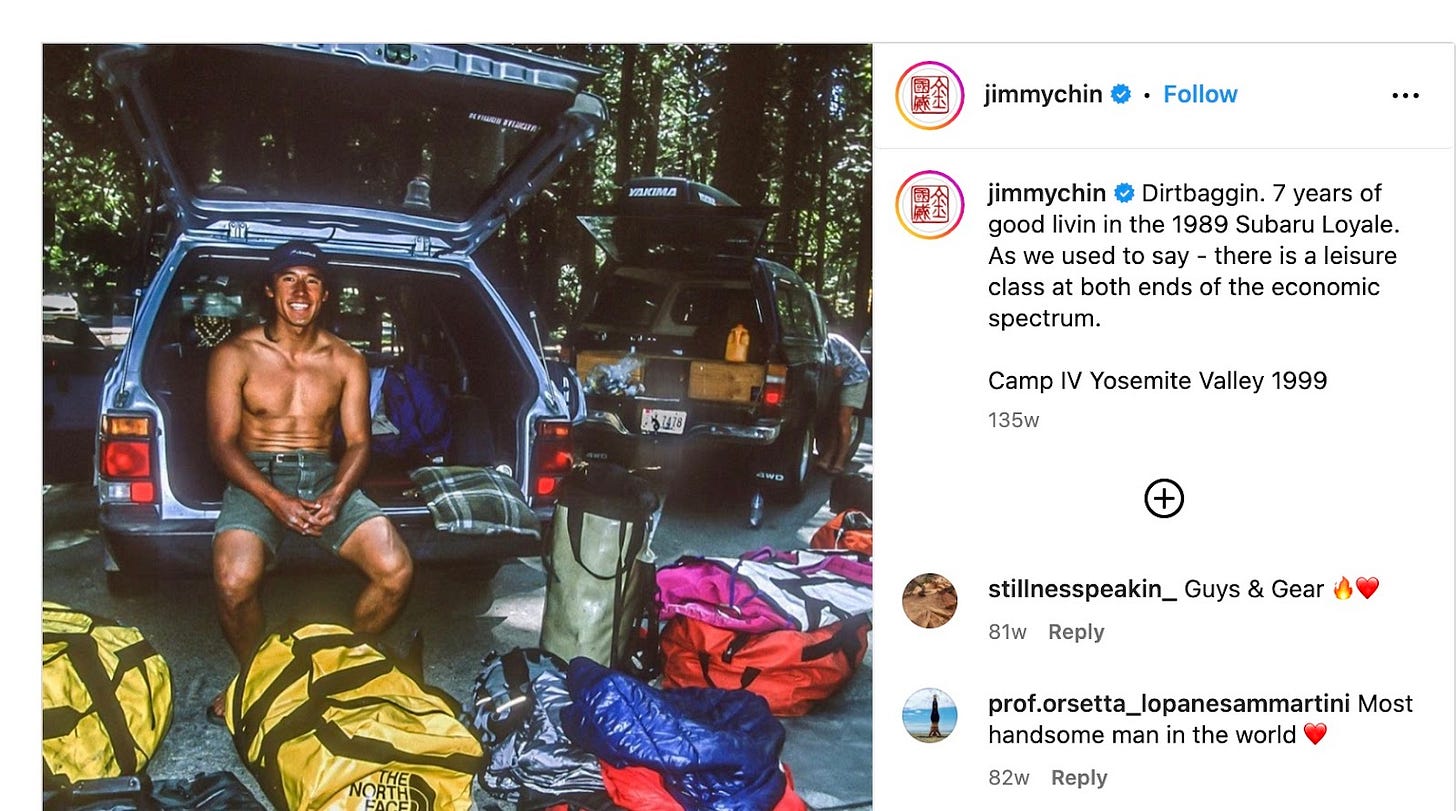
But that’s pretty much only true for people who don’t have kids. What does the proverbial fisherman do if he gets cancer? Maybe he’s happy doing nothing but fishing, but is he making choices that limit the horizons for his children?
I’m aware that my childhood in Montana represents a kind of wealth. And nothing can ever replace the summers I spent as a wilderness ranger in the heart of the Selway-Bitterroot Wilderness. If money were no object and I had no other obligations, you’d probably find me somewhere in the Idaho backcountry or hiking the endless trails in the Yaak Valley and Cabinet Mountain Wilderness near my boyhood home. But that would not be my kids’ idea of heaven. Even if I were to move back to Montana with a secure retirement and pack my chainsaw around cutting firewood for the fun of it, I’d have about as much in common with my uncle outside of family memories as Seinfeld would with the fisherman.
As I wrote in response to Sam Kahn’s fine essay last week, I think of myself as belonging to my hometown community. But can I truly claim it as my tribe? I’ve done nothing, really, to give back to the place that raised me. I'm one of those who left, who sold that birthright for a college degree and greener pastures.
And so in the end Montana always leaves me with a sweet sour ache of familiarity and distance, belonging and estrangement. Perhaps one day I will crack the riddle of the Last Best Place. But I suspect that the riddle is baked in too deep. Montana is so evocative because it shifts its shape perpetually, because it is defined, simultaneously, by so many rich and contradictory things.
My memoir, Down from the Mountaintop: From Belief to Belonging, traces how I quelled that homesickness for a time by making a home in Iowa. But now that I’m making a new home in Pennsylvania, I find that those exile tropes have returned with even more force than before.
Franklin’s essays are often loosely based on facts, such as the actual Treaty of Lancaster, but the words he attributes to the indigenous speaker here should be understood as satirical embellishments. As in “The Speech of Polly Baker,” where Franklin adopts the narrative persona of a woman fined for giving birth out of wedlock, “Remarks” conveys figurative truths and should not be mistaken for a literal account.




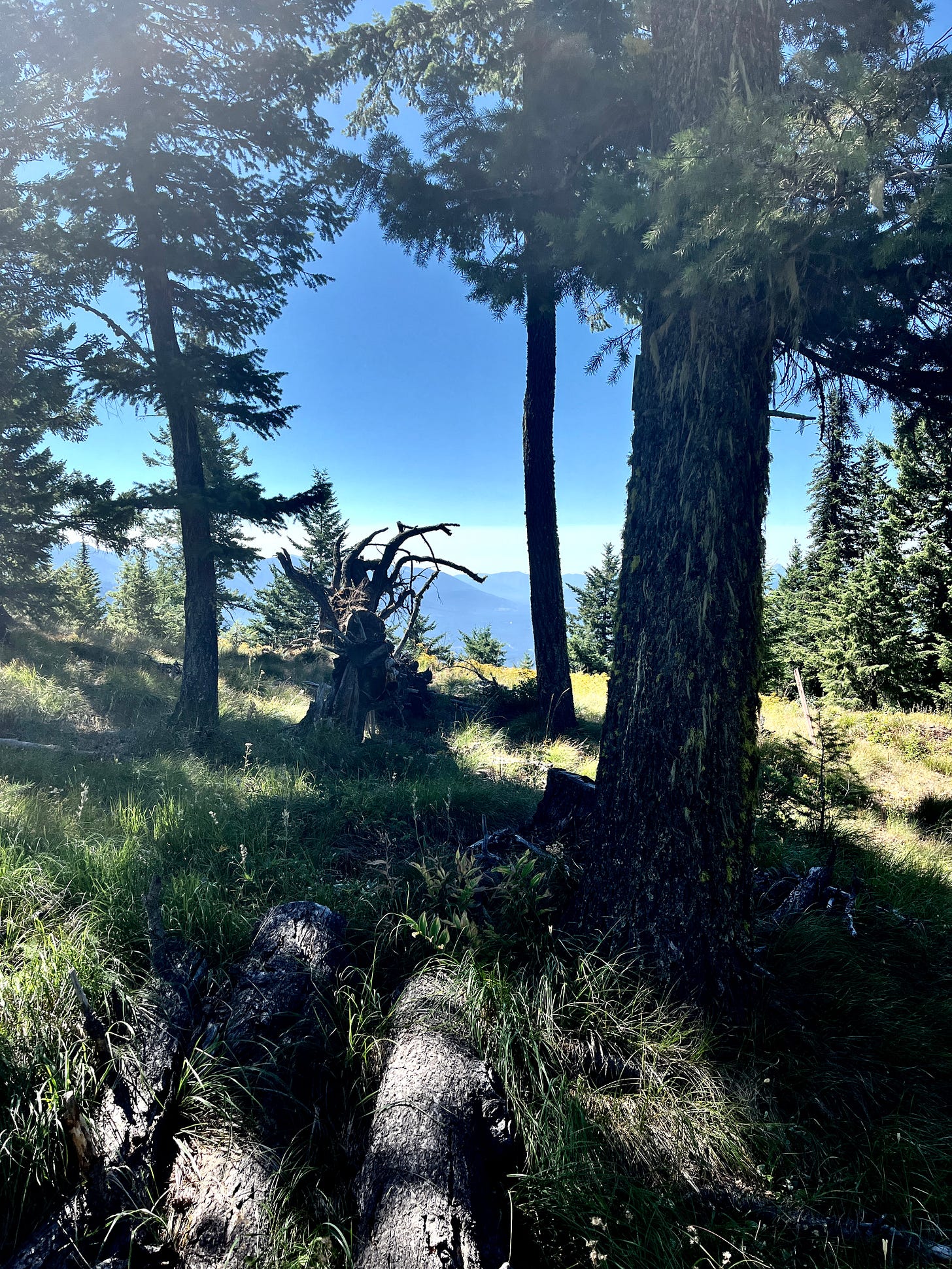
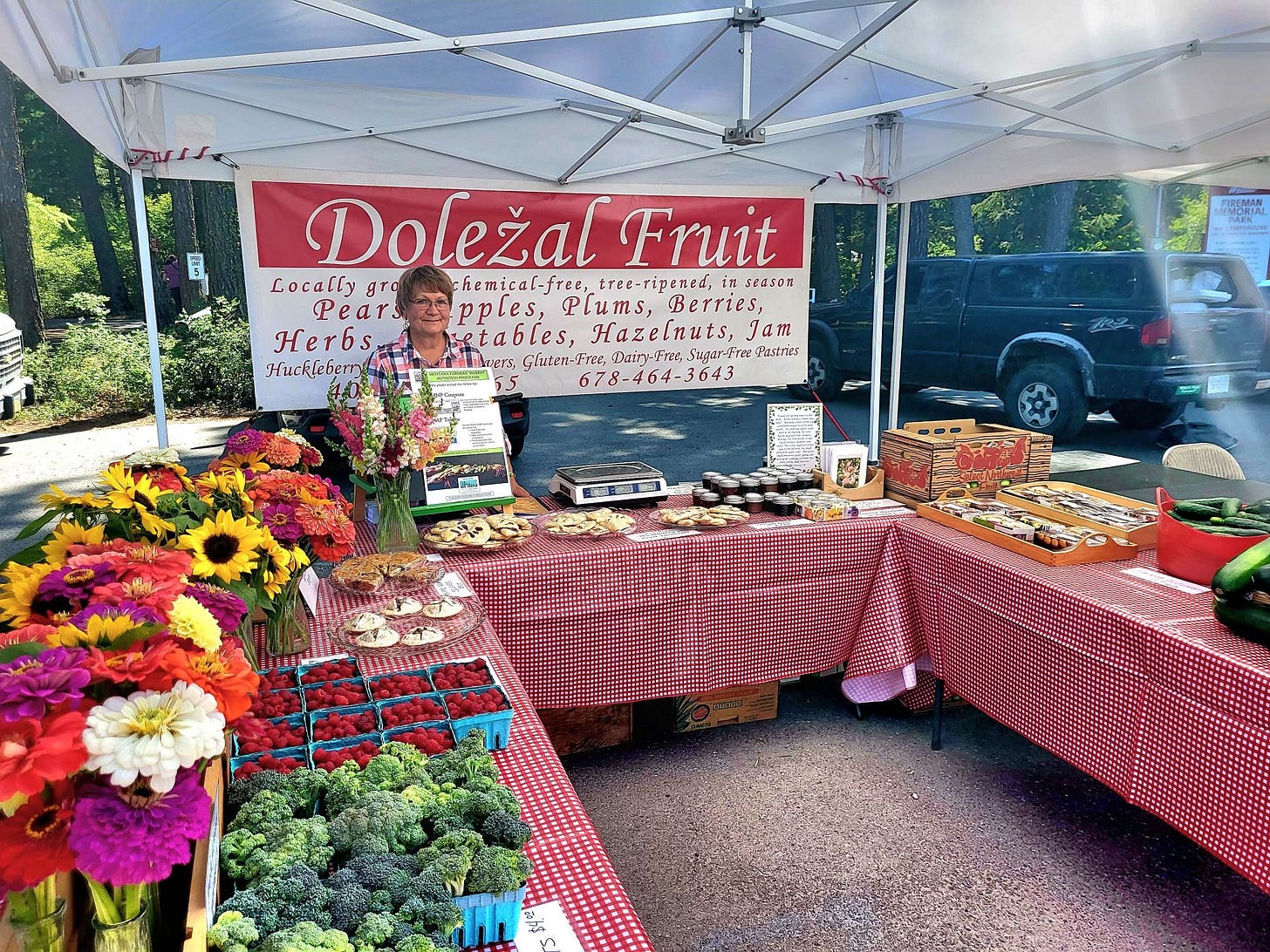
This is so beautiful. My heart aches.
I thoroughly enjoyed this, Josh. And do remember you as a student. I will never forget the CD of flamingo music you presented to me one evening a the HOT CLUB. I would love to see you and your family sometime on one of your trips “home”.